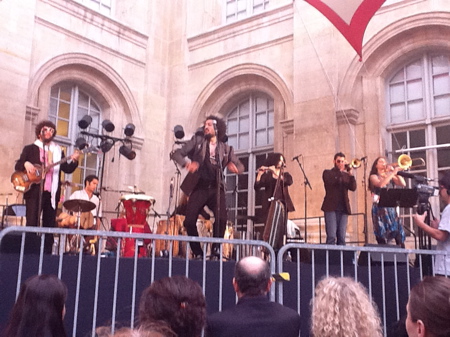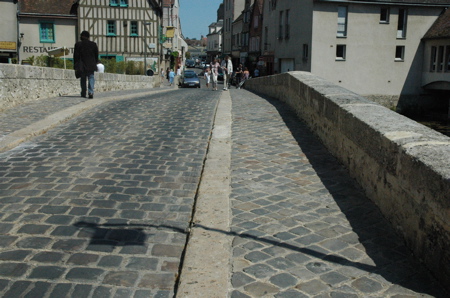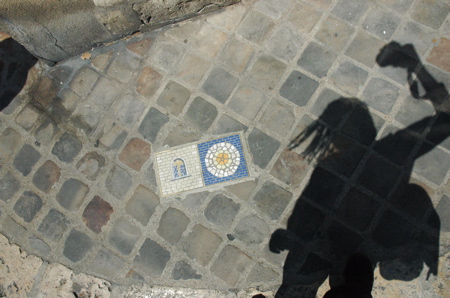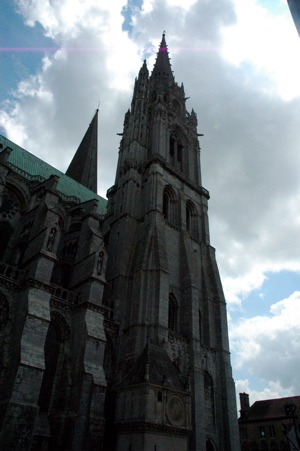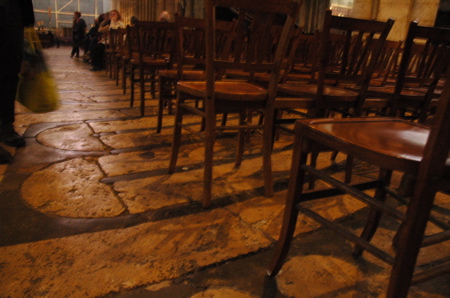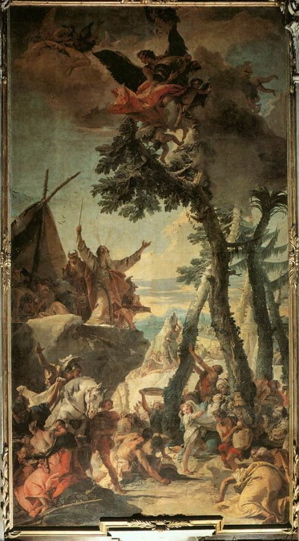22
Jun
Watch VIDEO of the Music Festival in Paris
Last night, a friend invited me to a concert at the Museum of Jewish Art. She ended up not showing up. And I got to discover Paris.
The band, Yemen Blues, was electrifying. Based in Tel Aviv and New York, the group perform Blues, Folk and Funk, singing in different languages, including Hebrew and Arabic. The song that simply blew me away was in Créole (you can hear a portion of it in the video above).
At the concert, I met a young French woman of Italian origin. After Yemen Blues, she showed me other musical scenes in the city. I found out this was a special night. It was La fête de la musique in Paris, one of the most popular musical events that has occured every year on June 21st for the last 2 decades. The event has become so popular that it is now happening all over cities in Europe.
As we walked on the streets, cafés were packed. There were bands playing everywhere! On George Pompidou plaza, we saw a group of Taiko drummers, competing for attention right next to a marching band. On the other side of the plaza, an Afro-Caribbean group was curled up in a tight circle, singing a cappella.
Even in alleys, there was music. I passed by an Asian band that was finishing up its performance by the side of la Cathédrale Notre Dame de Paris. The band had ardent fans who jumped and waved as I filmed. Further up next to the sculpture pond, a rock band was blasting away.
This street music festival was set to go on until 5 a.m. Never mind that the next day was a workday in Paris! By 11 pm, my new friend bid me goodbye to catch some sleep and I continued wandering through the city. A poem I once read on the métro came to my mind:
“I have often dreamt of writing a book on Paris that is like an aimless long walk where you find nothing of what you’re looking for, but lots of things you were not even aware of.” _ Julien Green
That poem embodied the night of musical Paris.
In the streets, I mingled with a joyous crowd of people of all ages. Several young men were holding bottles of beer as they walked and chatted with friends.
Some people were even shopping while listening to music. Stores were still open, quite an exception to their usual 6 p.m.-closing time. At the door of a store, a young man greeted me by reciting a Fable of LaFontaine.
“Oh! You are the most beautiful of the guests in these woods.”
I laughed and headed home. Time to sleep. It was close to 1 a.m.
21
Jun
In France, I discovered that the process of naming a child can be a cultural adventure.
Claudine Brillant and her husband live in a small village outside of Chartres. They decided to find a name for their child by pulling out a calendar. French calendars list names of Catholic saints and their commemorative dates.
Starting with the month of January, Claudine ran her finger down the days, looking for a name. She got to Sainte Sandrine; she looked at her husband, who shook his head. With a name like Sandrine, kids at school might tease her and call her Sardine. They finally settled on the name Sophie from Sainte Sophie found on May 25.
In Tours, central France, a young couple went cruising through old cemeteries to look for not-so-common names for their unborn child. They had a baby a few weeks ago and named her, Adelaïde.
In my family we don’t bother being creative with our name search; we honor an ancestor by naming the child after him. It keeps things simple.
“There is a mistake here. My Mom is not that old!” exclaimed my nephew, who is browsing through our family tree on my iPad.
I looked over his shoulder and checked to see.
“That’s not your Mom; it’s your great-aunt,” I replied.
The two women have the same name, Mulanga, but were born 20 years apart. Mind you, these are first names. Family names do not exist traditionally in Luba culture.
In my family, name repetition is rampant. My grandmother Mbuyi already has 7 descendants named after her; I have so many cousins named Mbuyi, including my oldest sister.
But you don’t have to follow the Luba tradition to find a name for a child. If you open old literature books, you might find interesting names like the Gaulish name, Wouivre, which means snake or a river that snakes through the landscape.
I am having lunch with my friends, Cyprian and Martine at their home in Chartres, France. It is a simple fare of tabouleh salad, pasta with homemade mayonnaise and delicious bits of salmon mixed in.
On television, there is a documentary on Armenian Christians of France. At the table, we are talking about social integration in the country. It all started when I asked if immigrants were welcomed in French society.
Martine replies yes, but they are expected to become fully French as they live in France.
“We are very proud of our history and expect people to know it,” says Martine, explaining that it is the base of French patriotism.
The fact that Russian nobility in the 17th century spoke French is still a source of pride for French citizens today. They are proud of their culture, of their language and want to conserve it.
French was the lingua franca for 3 centuries, only recently overshadowed by English. In an effort to preserve their language, French conservators are requiring, for instance, that American movies showing in Paris theaters be dubbed instead of subtitled.
I remark how different that attitude is from the United States. When I became an American citizen, the juge at the beautiful courtroom ceremony said words that warmed my heart:
“Although you have sworn loyalty to the United States government, you should keep your culture, your language, because with your heritage, you enrich America.”
By contrast, French of the right wing say: throw out your culture in order to become French.
Martine explains French conservators fear losing their Frenchness. They want to hold on to the French culture by all means. That includes creating courses to bring immigrants up to speed with French history and behavior. Indeed, after a couple of generations, the immigrant family looks very much French.
What conservators do not realize is that you do not lose your culture by living next door to someone who has a different one.
“I cannot expect Cyprian to have the same childhood memories as I do,” Martine says. “That’s impossible and ridiculous.”
At one point she opens a tupperware. The smell almost knocks me out. Martine cuts into the Camembert and offers us a piece. Cyprian and I both vigorously shake our heads no. I like cheese, but not that kind. As for Cyprian, he does not eat cheese. Period. I am sure Martine would faint over some of our strong smelling African dishes.
“I am married to him and we have children together,” Martine continues. “And I still consider myself very much French.”
Martine was born and raised in Chartres. Cyprian is originally from Nigeria and as he says himself he has firmly planted ‘his bottle’ (ie. his life) in Chartres, France.
They are not unique as far as mixed couples.
I remember the first week I was in France. I was standing in the main aisle of a supermarket, watching people as they shopped. I saw so many mixed couple pass by; I was amazed.
Despite its conservatism, France has the highest number of mixed couples in Europe.
19
Jun
The meaning of spitting among the Luba people of Congo.
17
Jun
From Paris, I take the train to Chartres. The train is like a time machine. The moment I get out of the station, I step back in time to the Middle Ages.
Cyprian Josson and his wife Martine come to pick me up. Soon the car wobbles slowly on the cobblestone-paved street. I feel like I have landed in a different universe. We get out of the car and start walking through ancient paths.
Chartres is old and magical in a very different way from Paris. I can’t figure out why Chartres feels so differently.
Maybe it’s the time period.
“It’s a charming medieval village,” said Leslie, an American friend of Cyprian, who has been living in Chartres for the past 21 years. ”The cathedral [of Chartres] was built on an old druid site that has strong vibrations for women.”
Maybe it’s the cathedral and its grotto underneath that makes this town so unique.
The cathedral rises like a link between the earth and the sky. Through times, it was a place of pilgrimage in France, where Christians came to see the Black Virgin, a statue made by Druids before the birth of Jesus. The energy current _ in the Druidic cave below _ is said to awaken a person to the spiritual life in her.
Now I understand why during my visit of the cathedral I saw a woman walking around with her hands raised as if to feel and be in tune with the energy of the place.
I admit there is a good feeling in that church; it is quiet and dark and cool. At one point, I decide to sit down in a corner and meditate.
La cathédrale de Chartres has a famous labyrinth, etched in its stone floor. I have been wanting to walk it for years.
There are chairs all over it for Sunday mass.
I learn that once a year, usually on June 21st, they remove the chairs so that people can walk the labyrinth. I make a mental note of the date.
I will be back in Chartres the weekend of June 25th to attend the Gospel Festival of Chartres, Cyprian is organizing.
Maybe I will walk the labyrinth too.
16
Jun
Watch the VIDEO of Kabuika at the National Library in Paris
I went to la Bibliothèque Nationale de France (François Mitterrand). It was the only library in Paris where I could find books on the Luba culture. I discovered books of the 1960s on the Baluba. What a treasure!
The library is built for the conservation of books, films, audio recordings, etc. People are more like an afterthought. I am exaggerating, but only a little. The place has a clean, industrial feel to it.
La Bibliothèque Nationale holds an amazing collections of books and other items published and produced in France. Its aim is to preserve the collective memories of the country.
This is a role model for Congo. We really need to conserve our rich heritage.
If you want to die quickly, sleep with a Luba woman.
Wait a minute! I know what you’re thinking.
You must be saying, “a few weeks ago you wrote about how to marry a Luba woman (see story); now you’re telling us you can die if you sleep with her?”
Not exactly. If you have given a dowry for her, you are safe. If you have not, that’s when you die. Death is issued as a punishment for breaking the Luba law: sleeping with a woman you have no business sleeping with.
You might feel this is a bit harsh. However, one must understand the ramifications of such an act. In the traditional Luba society, when a woman sleeps with a man and that fellow does not marry her, she loses the chance of ever getting married. No marriage means no dowry received. Her whole family might crumble (see Book of Dowry).
So you can see why the woman’s family would want to kill you. You get the choice of two types of death, depending on the family you have offended.
Some have a tendency to kill by poison. In my village, I think it would be by lightning. We think it’s more precise. The outraged family would wait until you are alone in the house, then will send lightning that will burn down the house with you in it.
At the National Library of France yesterday, I found a kasala, a Luba song that tells the story of a man who slept with a woman and was punished by lightning. The man was named Kayembe and the song was written from his perspective. My guess is Kayembe did not survive the lightning strike and the song was post-mortem:
Kayembe A.K.A. “The-Vagina.”
My brothers and sisters, tell me:
What did I do that was so serious?
I did not stab G-d
I did not even insult Him.
All I did was admire beauty!
13
Jun
I’m Kabuika.
Although I have a typical Luba name, it is considered unusual in some parts of the world. My name is always an ice breaker when I meet new people.
Such was the case when I ran into Yves, a French man, standing outside of the cathedral in Chartres, France.
I pulled out my iPad and filmed our meeting. Here is a loose translation of our conversation in the video:
Yves: “What’s your name? Meredith?”
Me: “Kabuika”
Yves: “Kabuika? What a name! What a name!
… And what do you do in Chicago?”
Me: “I am an independent journalist. Here in France, I’m filming, interviewing, photographing tons of people. Then I put all the stories on my blog. And people get to follow what I’m doing.”
“That’s incredible!”
Me: “I will put you on YouTube.”
13
Jun
My adventures in Chartres, France continue.
My friend Cyprian Josson and I visit la Cathédrale de Chartres.
By the beautiful biblical statues, we meet a man who decides to sing to me, “La Vie en Rose.”
The portrait of France: romance and beret.
12
Jun
This week, with the Jewish holidays, I spent a lot of time at the synagogue in Paris. By praying and chanting psalms, you get to a point where you transcend and understand life better.
(11:1) And the people complained…
The Torah passage on Shabbat was in the Book of Numbers, chapter 11.
When the people of Israel left Egypt, they soon started to cry out for food in the desert, so HaShem sent them food. Manna fell out of the sky for them.
But more complaints ensued as they quickly grew tired of manna, saying that things were better in Egypt. The Jewish people bemoaned, “Why did we come out of Egypt.”
“Oh that we had meat to eat! We remember the fish we ate in Egypt that cost nothing, the cucumbers, the melons, the leeks, the onions, and the garlic.” (11:4)
G-d got angry and sent them meat and more meat, meat for “a whole month, until it comes out at your nostrils and becomes loathsome to you.” (11:20)
The people of Israel back in those days made the error of thinking that eating meat will make them happy. They pursued happiness in consumption.
We make the same mistake today.
We tend to acquire material possessions, thinking they will create our happiness. But is happiness really in the latest car or smart phone? Today, we are living in a very materialistic society, yet all our property does not make us happy.
A very good friend of mine in Chicago got up one day, called her friends and gave away all her possessions. This was not a yard sale. Everything was free! For many people, it was like Christmas; they came and took the refrigerator, the TV, the computers, the whole living room set. Everything! When all was gone, my friend said, “Now I can live fully.”
Back at the synagogue, the rabbi explained the people of Israel in the desert did not realize that to lead a happy life, they needed to put themselves in it. They were the spices of their own life. So it was up to them (as it is up to us today) to be creative and make manna taste like fish, melons or chocolate if we want.
We are the most powerful ingredient in our life.

